Everyone knows the saying “the customer is always right.” It’s a belief that stemmed from the need for businesses to satisfy their customers to get a loyal and consistent flow of consumers. But some take it too far – to the point that it gets too toxic and even bad for business. This is because they make the belief a rule rather than a guideline.
Unfortunately, it leads to many malpractices that cost way too much effort, time, money, and even company morale. This is why the best call center training in the world is centered on keeping their employees happy so that in return they can satisfy the customers’ needs.
This, then, brings us to this point: employee happiness must come first!
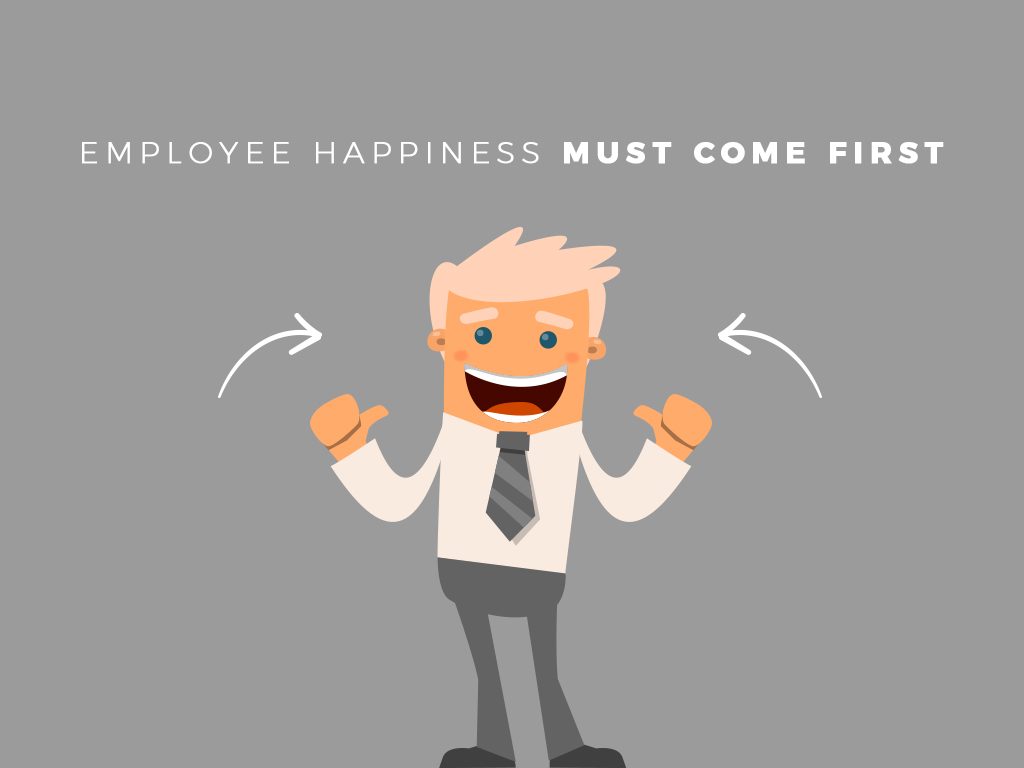
Employee Happiness Must Come First
No matter what company it is – whether it’s a retail store in a mall or a call center service in the Philippines – employees are the ones that keep it running. Without them, there will be no business; thus, no product or service will be made available for any customer to consume. By making all these connections, it can safely be said that there will be no customers without the employees.
Essentially, this is the reason why customer happiness must come first. In an ideal setting, you would want to keep both employees and customers satisfied. But, when it comes to choosing between the two, your first pick should be your employees. Why? Because they are the building blocks of your company. If they become (and remain) unhappy, then this could turn out to be a huge risk for your business and branding.
This, however, doesn’t mean that all customer complaints and demands must be ignored. It only means that companies must also stand up for their team when they are being disrespected and abused. This brings us to the next point.
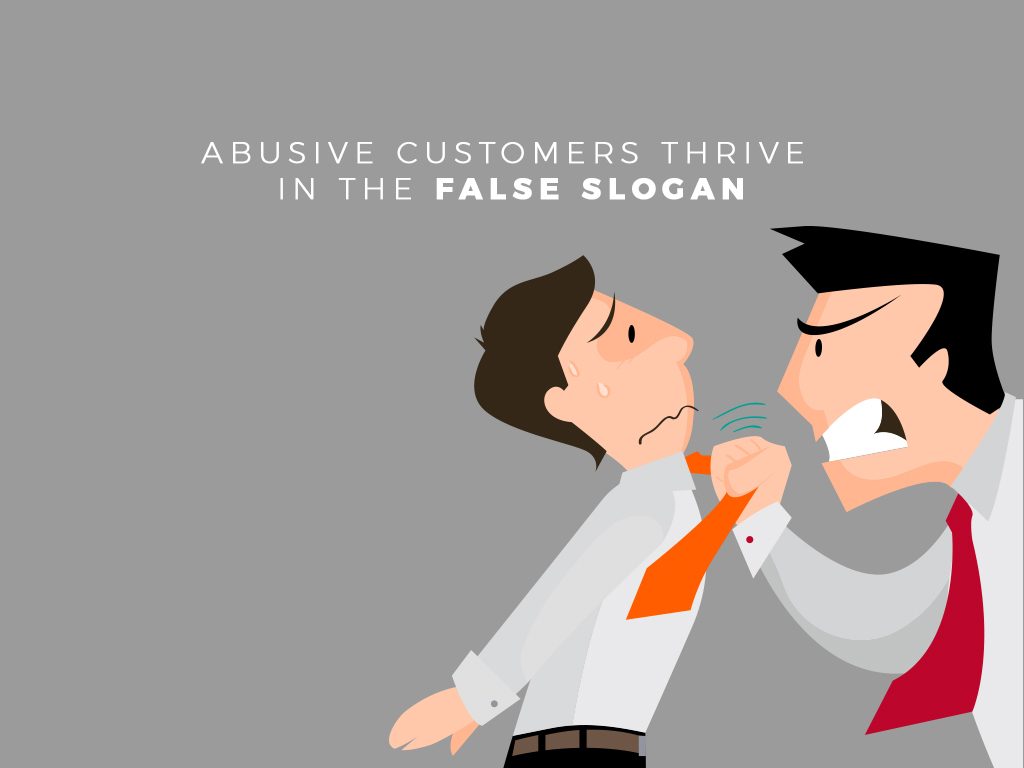
Abusive Customers Thrive in the False Slogan
Abusive customers may just have been born from the notion that the customer is always right. This is because it gives them the mindset that they can demand just about anything from the company and its people, even if it’s entirely out of their scope.
Imagine this scenario: a grocery store allowing an abusive customer to demand their bag boy to perform a valet service for his car. Not only is this irrational, but also completely out of line. This service is not included in the bag boy’s list of responsibilities. Moreover, if he did perform this service in his utmost ability, then the grocery store will end up losing one of its resources – a bag boy trained to put away a customer’s groceries at the end of their purchase. Without him, the store could end up losing more shoppers since it might affect their queueing time.
Now, these are the potential consequences you may face if you allow this kind of environment in your workplace. These toxic people will not only abuse your workers but also run your business down.
Ultimately, companies that religiously follow this slogan will end up losing their more ideal consumers. Even more so, if they allow this kind of behavior to thrive in their business, they are encouraging these people to continually make unreasonable demands. It essentially starts a vicious cycle that will actually cost the company more money. How? Because more resources will be needed to satisfy such customers.
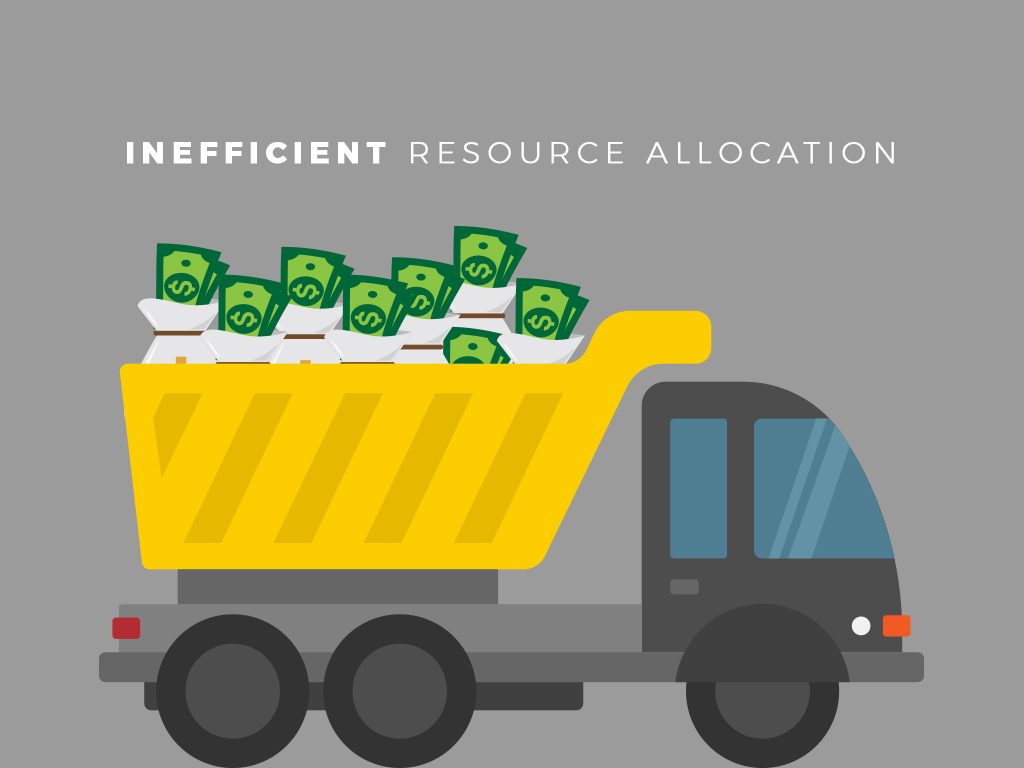
Inefficient Resource Allocation
Companies have limited resources, and they need to use them in order to take any action, which includes having proper customer service. Call centers in the Philippines know this and that’s why they invest a huge amount in hiring a strong workforce to be able to provide service on a large scale. But no matter how large this scale is, if the allocation is not done properly, then money will end up being lost.
Losing resources happen when too much effort goes into trying to please an insatiable client. Time, money, and energy will all be wasted in doing so. Like mentioned above, this doesn’t mean that all the concerns of said customers should be ignored. But it does mean that businesses should know when to move on from them so that their service/s will not be abused.
Instead, more resources should be allocated for the reasonable consumers that are willing to engage in a discussion when they are dissatisfied. Once you’ve reached a compromise with these people, they will turn into loyal brand ambassadors that will help a company reach new heights.
In short, the lessons that should be learned from here are that not everyone is worth pleasing and that resources should be put in the right places.
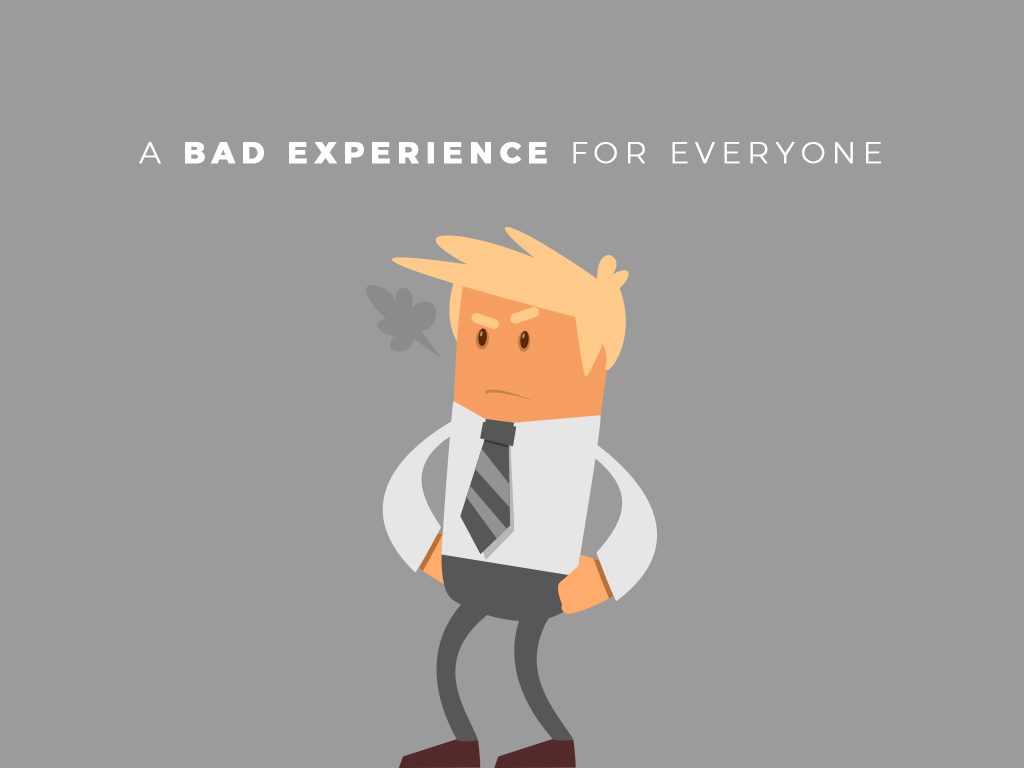
A Bad Experience for Everyone
Another point worth discussing is the effects of abusive customers to good consumers. Basically, no one wants to be around an angry person. Shoppers do not necessarily want to encounter someone full of rage when they just calmly go about their business. They do not want their day to be ruined by an irate customer who starts screaming like a child, demanding to be served and satisfied. This is a sight and experience that can turn them away from a store.
Thus, businesses shouldn’t want this type of customer in their stores. It creates an unpleasant environment that can turn potential loyal consumers away. Plain and simple, no store or business deserves to have this type of environment. It’s toxic for everyone.
Hence, no good business will subject their employees and customers to this kind of environment. In fact, they will give their workers the authority to stand up for themselves so that they can continue serving the loyal consumers.
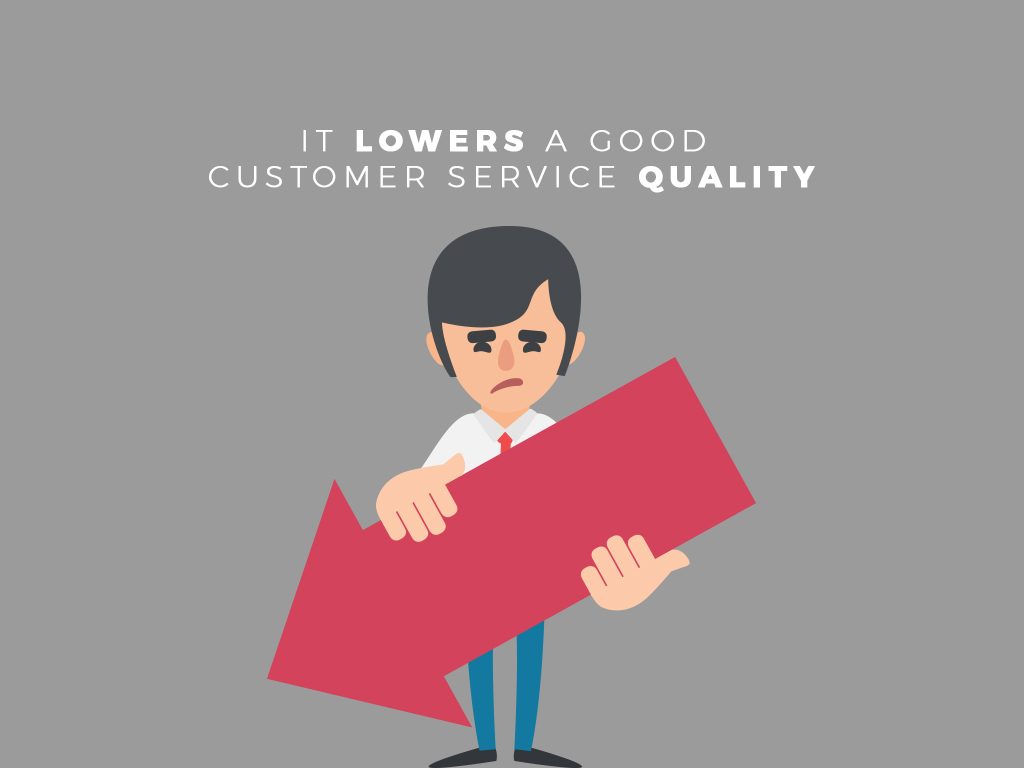
It Lowers a Good Customer Service Quality
Backtracking a bit to employee happiness, this must absolutely be prioritized over customer satisfaction because this is needed for the workers to perform well. Basically, a happy employee is an efficient one. In turn, their efficiency will lead to the coveted customer satisfaction!
Many successful industries, including call center services in the Philippines, know this. Keeping their customer service representatives happy will essentially give them more motivation to keep their customers satisfied all throughout their interactions. This means that there will be less irate customers for a company to handle.
On the other hand, employees that feel like they aren’t cared for by their company will become demotivated and devalued. They will feel like they don’t deserve to be treated fairly and with respect. How can a company then expect them to provide quality service if they are treated like a machine that earns money for the business? If somehow they are able to provide it, then it would have been with a heavy heart.
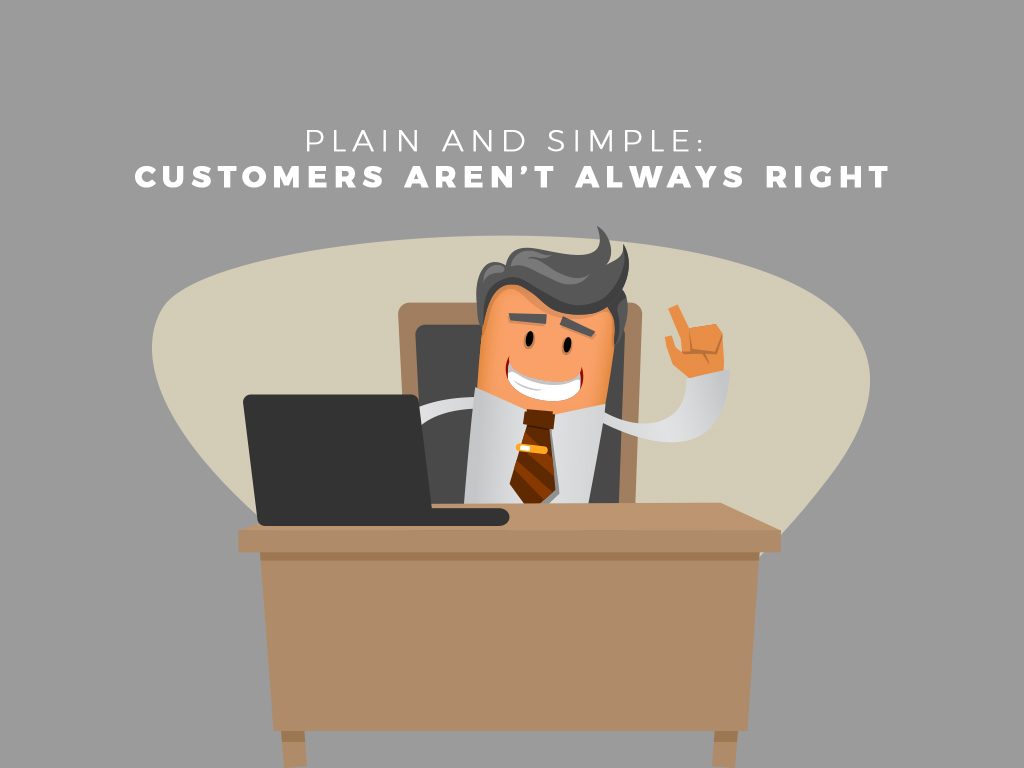
Plain and Simple: Customers Aren’t Always Right
Statistically speaking, it’s impossible for all customers to be always right. Think about it: how is it feasible for millions of personalities to be correct all of the time? Blue isn’t automatically red just because a customer says it is. Of course, that is an extreme example, but such people do exist.
A more realistic example, however, is if a customer is downright offensive. If he is making racist, sexist, or any discriminating slurs, then a company has the right to refuse him their services. This also applies to those who perform physical harm, verbal abuse, vandalism, and other criminal actions.
Additionally, customers shouldn’t be seen as experts, who have been trained to learn and know a product or service really well. Instead, this recognition should fall on the employees since they are the ones, who are knowledgeable about a certain brand or company.
Unfortunately, there will be always a few consumers insisting that they know everything, which can really be frustrating. But businesses shouldn’t give in by indulging them and their unreasonable demands. Rather than doing that, they should properly educate them to curb this problem. Services such as the various call centers in the Philippines specialize in this and were created for the purpose of having an expert help people solve their issues.
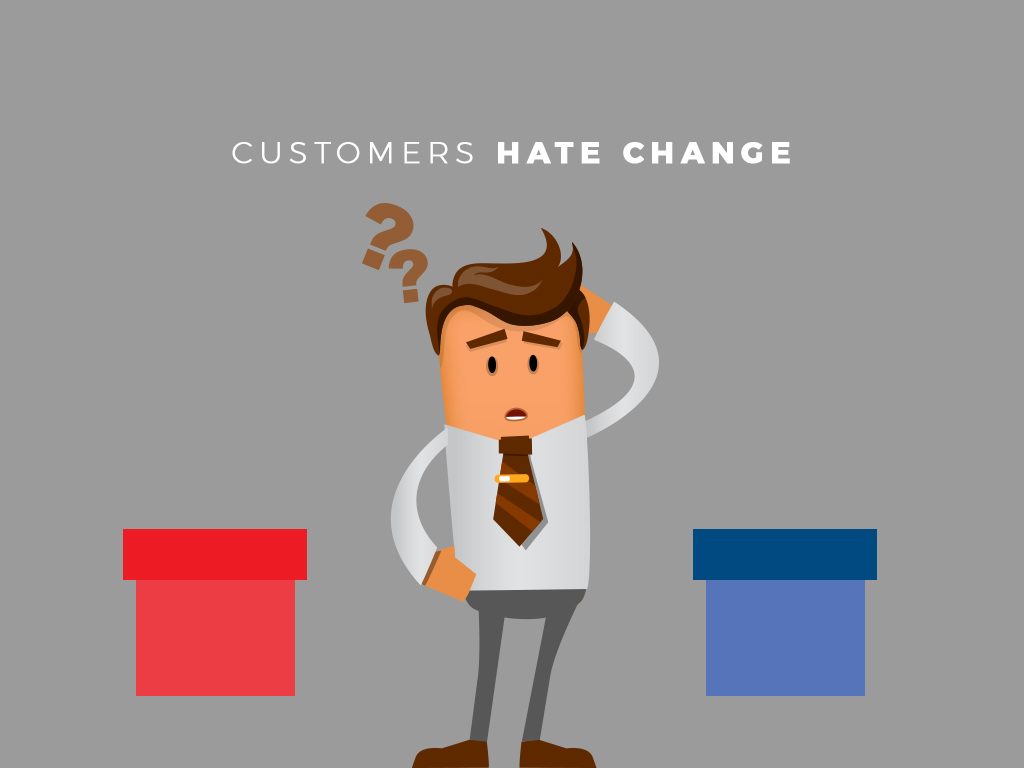
Customers Hate Change
Lastly, sometimes the customers don’t know what they want, especially when it comes to big changes in products or services. This is because many consumers love to stick to what they’re used to. Thus, they also want their favorite products to stay the same; when a change comes, they tend to complain and scream for the business to not push through with it. However, what they don’t know is that improvements are made based on customer feedback. This means that they, themselves, ask for it to happen. This is why, in most cases, they end up accepting a new product only after they’ve tried it.
Key Takeaway
When all is said and done, it can all be broken down to one rule of thumb: companies must choose their employees over their customers. Doing so will make the workers happy to provide a quality service that will please most consumers. However, in the event that a customer is left dissatisfied by their services, then the company must do its best to meet his demands – but not at the expense of the company’s resources.
Businesses can take cues from the practices of call center services in the Philippines. It’s a booming industry centered on providing customer service and satisfaction. At the same time, they also give specific importance to providing their workers with the best benefits, salaries, compensations, and lifestyles. This is why many call center employees end up really happy.

Co-CEO & CCO
US: 866-201-3370
AU: 1800-370-551
UK: 808-178-0977
j.maczynski@piton-global.com
Are you looking for an onshore, nearhsore, or offshore outsourcing solution? Don't know where to start? I am always happy to help.
Let's chat!
Best Regards,
John
Success in outsourcing isn't a matter of chance, but rather the result of a meticulously defined process, a formula that Fortune 500 companies have diligently honed over time. This rigor is a significant factor in the rarity of failures within these industry titans' outsourced programs.
Having spent over two decades partnering with and delivering Business Process Outsourcing (BPO) solutions to Fortune 500 clients, John possesses an in-depth understanding of this intricate process. His comprehensive approach incorporates an exhaustive assessment of outsourcing requirements, precise vendor sourcing, and a robust program management strategy.



